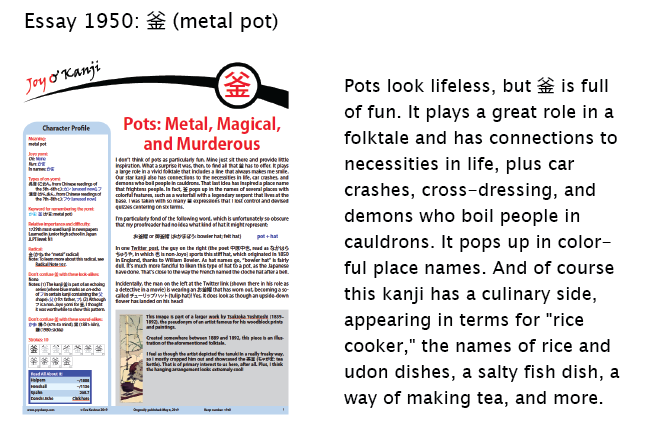A Slog, a Squeal, and Sushi
When I study Japanese, I live for "aha!" moments. Those are not only some of the best experiences in life but also a most welcome salve after the pain of feeling completely lost and hopelessly stupid when it comes to Japanese. That's how I mostly felt when I worked with my language partner Kensuke to read the Wikipedia synopsis of the movie 「豚と軍艦 (ぶたとぐんかん: Pigs and Battleships)」. The vocabulary was way too hard for me, and as soon as I'd looked up one word or heard his explanation, I forgot the meaning of the last hard term.
Then we came to this long bit:
豚の飼育係を任され一時出世の夢を見たものの、内輪揉めに巻き込まれて自滅していくチンピラ男と、その恋人で、男たちに蹂躙されながらも自分の足で歩んでいく女。
The man left in charge of pig breeding is a delinquent who dreams for awhile of being successful but is dragged into a family quarrel and self-destructs. His girlfriend was raped by men but comes to stand on her own two feet.
豚 (ぶた: pig); 飼育係 (しいくけい: breeder); 任す (まかす: to leave to a person, shown here in its passive voice); 一時 (ひととき: awhile); 出世 (しゅっせ: success in life); 夢を見る (ゆめをみる: to dream); ものの (but; although); 内輪揉め (うちわもめ: internal conflict; family quarrel); 巻き込む (まきこむ: to involve, drag into it, shown here in its passive voice); 自滅 (じめつ: self-destruction); チンピラ (delinquent); 男 (おこと: man); 恋人 (こいびと: lover, girlfriend); 男たち (おとこたち: men); 蹂躙 (じゅうりん: violation); ながらも (although); 自分の足で歩む (じぶんのあしであゆむ: to stand on your own two feet); 女 (おんな: woman)
Slogging through this sentence was about as easy as walking across a barnyard that no one has cleaned up in awhile! And yet two thrilling things happened by the time we reached the end. I've highlighted them in red.
After initially stumbling over 巻き込む (まきこむ: to involve, drag into it), I let out a piglike squeal of excitement and recognition, telling Kensuke that I knew the word, thanks to him and another Wikipedia article. He was puzzled, so I tried to remind him of the Kore-eda film that we'd read about months ago, a movie that neither of us had seen but that had captured Kensuke's imagination for some reason. "It's about two Shinkansens that pass each other at the same time on Shikoku," I said. Kensuke drew a blank, so I searched for "Kore-eda" and "Shinkansen" in Japanese and retrieved the page. Ah, the Shinkansens were actually supposed to be on Kyushu. And the movie is「奇跡(きせき)」, I Wish.
Once on the Wikipedia page for that film, I located the same verb, which was in this sentence:
そして、2人は周りの大人を巻き込んで計画を立て始める。
And then the two of them involve the adults around them and start to make a plan.
2人 (ふたり: two people); 周り (まわり: around); 大人 (おとな: adult); 計画を立てる (けいかくをたてる: to make a plan); -始める (-はじめる: to begin)
"How did you remember that?" Kensuke asked. I laughed and said it was simple. Back when we read the sentence, I was quite taken with 巻き込む. It primarily means "to roll up," as in 巻き物 (まきもの: makimono), the type of sushi that's most popular in the United States. The figurative and secondary meaning of 巻き込む is "to involve; drag into," which made me imagine people rolled up in a makimono against their will, their long legs coming out of the top. I wasn't trying to create a mnemonic, but it certainly gave the word staying power in my mind.
Let's go back to the pig-breeding slog of a sentence. The second reddened part gave me trouble because the okurigana tripped me up. How was I to read 歩んで? Kensuke supplied the answer: あゆんで, coming from 歩む (あゆむ), which means the same thing as 歩く (あるく: to walk) but is more literary. Then he provided this explanation:
歩むと言うと、実際に歩くことではなくて、「人生を歩む」という風に目に見えないものを進む感じがします。
When we say 歩む, we perceive it as going forward in some way you can't see, as in 人生を歩む (going through life), rather than actually walking (on a road).
歩む* (あゆむ: to walk); と言うと (というと: when saying); 実際に (じっさいに: actually); 歩く (あるく: to walk); 人生 (じんせい: life); 風 (ふう: manner); 目に見えない (めにみえない: not visible); 進む (すすむ: to go forward); 感じがする (かんじがする: to have a feeling (that))
I realized that the 歩む in the Wikipedia pig sentence must have nothing to do with actual walking and everything to do with metaphorically walking through life. Here's that bit again:
男たちに蹂躙されながらも自分の足で歩んでいく女。
His girlfriend was raped by men but comes to stand on her own two feet.
Somehow this gave me the second "aha!" moment in our conversation, and I blurted out "to stand on your own two feet." Kensuke responded with 自立する (じりつする: to be independent). Aha indeed! We understood each other! What a miracle!
I looked in the Japanese database I've been keeping for 13 years and discovered this entry:
人の歩む道 (ひとのあゆむみち: the course of a human life)
It came from a conversation that Kensuke and I had on May 23, 2009—exactly 10 years ago! I noted then that "歩む is more literary than 歩く." What?! I've encountered 歩む before?!
All of this reminds me of Kore-eda's title Still Walking. Was 歩む in the title? Nope. It's 「歩いても歩いても」, featuring two instances of 歩く. Oh, well!
Speaking of movies, after talking about Pigs and Battleships, Kensuke and I moved on to Ramen Teh, which I was to see that night and which I ended up loving. More pigs (in the form of pork), more Japanese, and a story largely set in tropical Singapore. I may have imagined it, but people seemed to speak Japanese an iota more slowly than usual. What a thrill to understand from time to time!
The most recent essay is about the type of vessel that would surely help someone cook the soups shown in Ramen Teh. Here's a sneak preview:
Catch you back here next time!
❖❖❖
Did you like this post? Express your love by supporting Joy o' Kanji on Patreon:



Comments